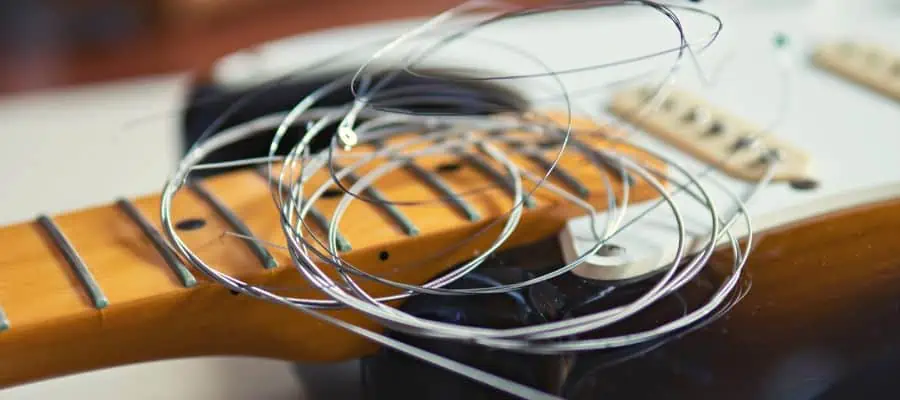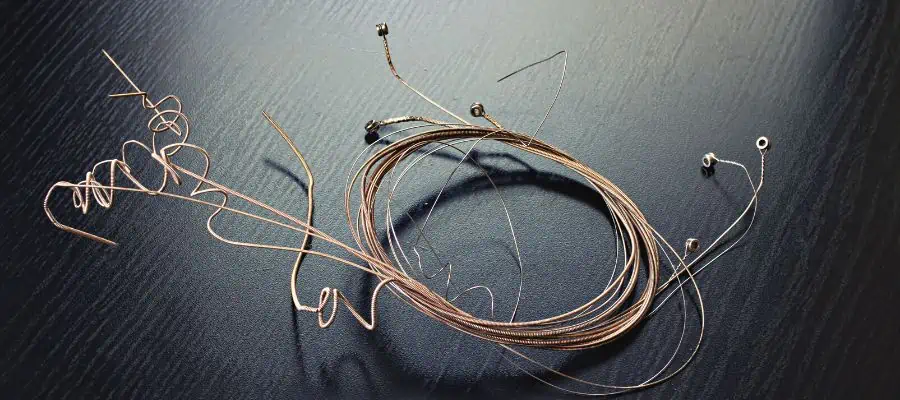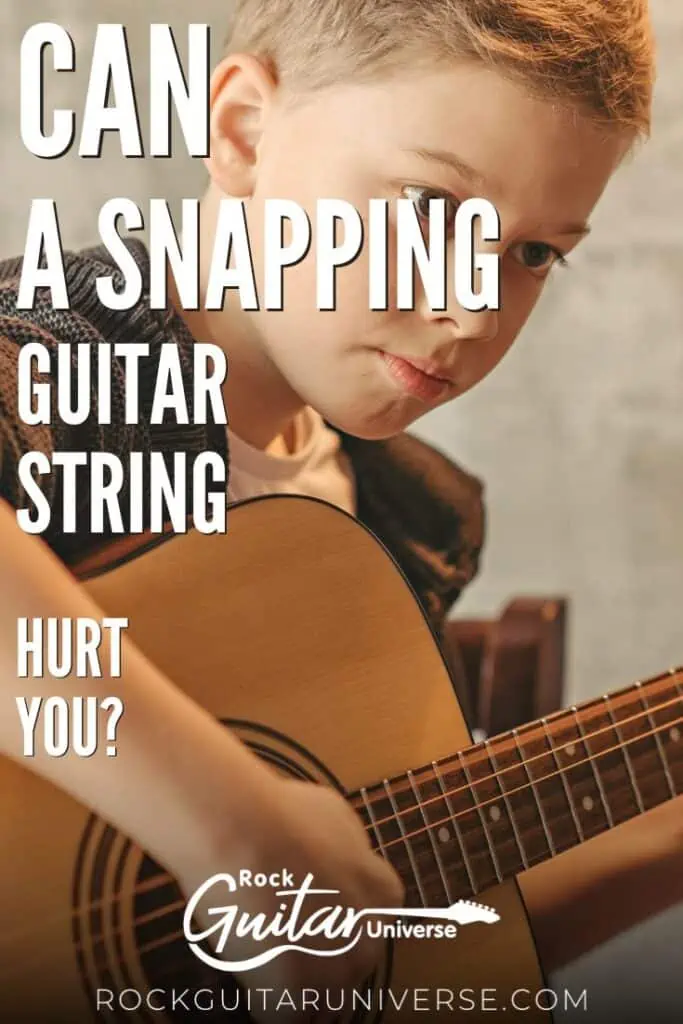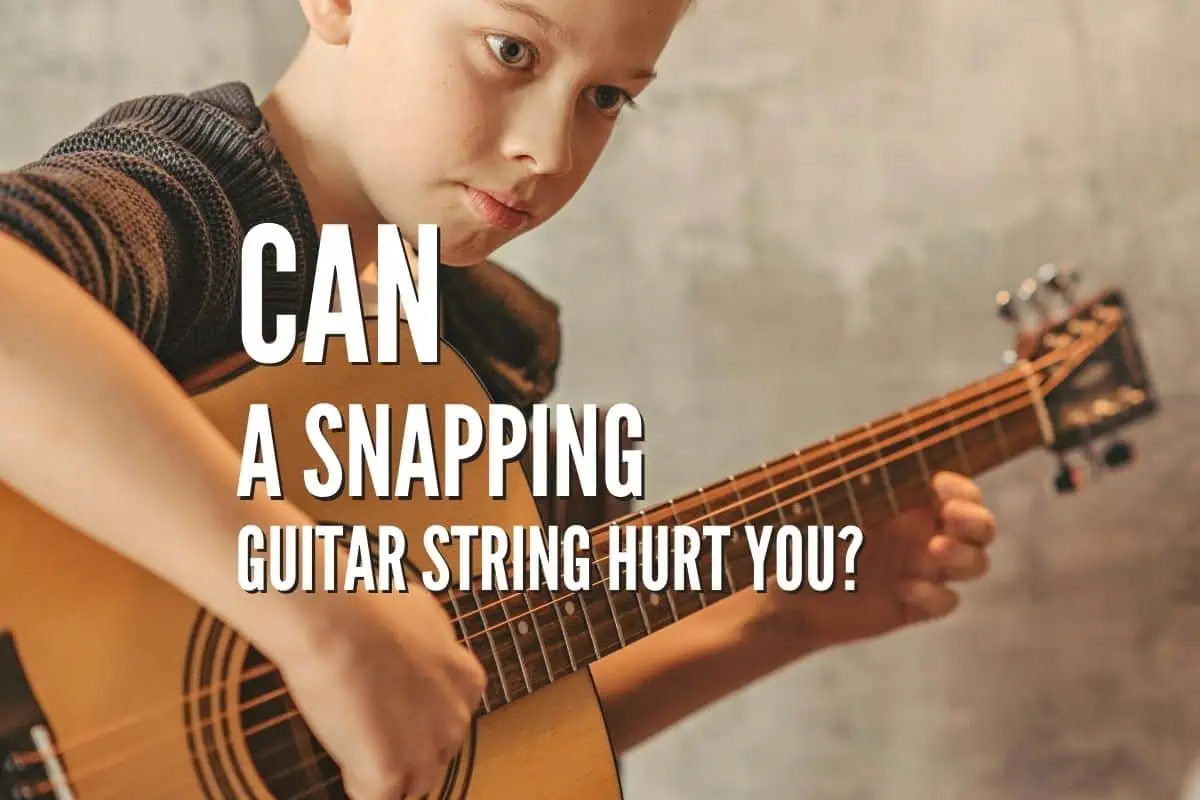While guitar strings are made to withstand tension and pressure, they aren’t indestructible. They can break for various reasons, such as age, excessive tension, and improper maintenance. You may have experienced the sudden, sharp pain of a broken string whipping against your skin, but is there a risk of more serious injury?
A snapping guitar string can hurt you, but the chances of getting seriously injured are very low. The force of a snapped string can cause wounds or bruises, depending on the type of string and the location of the break. You must take precautions to prevent injury and get medical help if injured.
While it’s uncommon for a broken string to result in serious physical damage, you must understand the hazards of playing the guitar. In this article, I’ll explore whether a snapping guitar string can hurt you in more detail and share tips to help you stay safe while enjoying your guitar.
Can a Snapped Guitar String Cause Injury?

When a guitar string snaps, it releases a high amount of stored energy, which can cause the broken end of the string to whip back and strike you. The force of the string may result in cuts and bruises subject to the type of string, where the break occurs, and how far away you are from the guitar.
Generally, strings under higher tension are more likely to snap. Plus, strings that break near the bridge or the tuning pegs are more likely to whip back and cause injury than those that break in the middle of the neck. Furthermore, if your head is closer to the guitar, you’re more prone to get hit with a snapped string.
The risk of injury is also higher with steel strings than nylon strings, as steel strings are thinner and under more tension.
Although the likelihood of being hurt by a snapped string is minimal, it’s always a good idea to take preventative measures, such as shortening strings near the guitar head to lower the possibility of eye-poking.
Below are the physical injuries that can result from a snapped guitar string:
- Cuts and bruises: If you are too close to the guitar when the string snaps, it can hit you with a lot of force and cause a deep cut or bruise.
- Eye damage: A snapping guitar string can also cause eye damage if it hits you in the eye. This is rare but can happen, especially if your head is close to the guitar.
Sometimes, the damage may be just a tiny scratch or bruise. However, in more serious cases, seek medical help if required to.
What Causes a Guitar String to Snap?

Here are the reasons your guitar strings may be susceptible to snapping:
- Overtightening: When you tune your guitar, you must apply enough tension to the string to produce the right tone. However, too much tension will weaken the string and leave it more prone to snapping.
- Wear and tear: Over time, constant strumming and picking can cause your strings to become worn and eventually break. If your strings look old, it may be time to replace them.
- Irregularity at your bridge or nut: A string may snap if there is a sharp area or other irregularity at your bridge or nut. This may result in the string breaking early and often until you sort it out. A professional should look at your guitar, as they can replace certain parts to prevent further snapping.
- Extreme temperatures: If you leave your guitar in a hot car or cold garage, the strings can become brittle and more prone to breaking. Store your guitar in a cool, dry place to prevent this.
- Type of guitar: Acoustic and electric guitar strings differ in terms of their likelihood to snap. Generally, electric guitar strings are under less tension than acoustic guitar strings, making them less likely to break.
How to Prevent Guitar String Injury

Playing the guitar is a wonderful and rewarding hobby, but taking precautions is crucial to minimize the risk of getting hurt by a snapped guitar string.
What you can do is:
- Don’t put your face too close to the strings while tuning. If a string snaps, it can hit you in the face and hurt you badly. So, give yourself space and place the guitar away from your head, especially when changing the strings.
- Regular string maintenance: After playing your guitar, cleaning the strings with a paper towel or a microfiber cloth will significantly enhance the life of your strings. Rubbing the strings off sweat, dirt, and oil from your fingers will prolong their life and decrease the chance of snapping.
- Replace old strings with new ones regularly. Old strings are more likely to snap, so changing them out is important before they wear out completely. Check your strings for signs of corrosion, fraying, or other damage that may indicate that your strings are weakened and at risk of breaking. If you detect any issues, the strings should be replaced immediately.
- Don’t overtighten your strings. Tightening your strings too much can put extra tension on them and increase the risk of snapping. Use a tuner and string winder to help you get the right tension.
- Wipe your strings after playing. The sweat and oil from your fingers can cause your strings to wear out faster. Therefore, use a cloth to wipe down your strings after playing to help them last longer.
- Wear Protective Goggles: If you still feel anxious about snapping strings, use a protective pair of goggles when restring your guitar to avoid eye injury. This is more of a psychological protection rather than a physical one.
Conclusion
While it’s possible for a guitar string to snap and hurt you, the chances of severe injury are relatively low. However, you must take precautions, such as properly maintaining your guitar to reduce the risk of injury.
If a string does snap, make sure to remove any broken pieces of string from the guitar and dispose of them. If the string has whipped or cut you, clean the wound thoroughly and seek medical help if necessary.
If you found this article useful, you may want to save this pin below to your Guitar board.

Recent Posts
When learning new songs have you noticed that some of the chord sequences sound really good? But when you tried to come up with your own chord sequence, or as we call it chord progression, you found...
Some guitarists insist on buying an expensive amplifier with their electric guitar. They assume that this is a must for every type of guitarist out there. However, in some situations, this isn’t...

